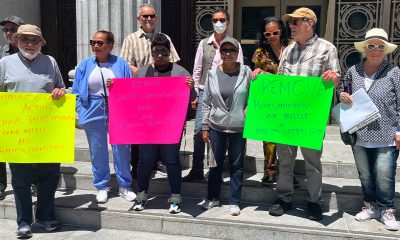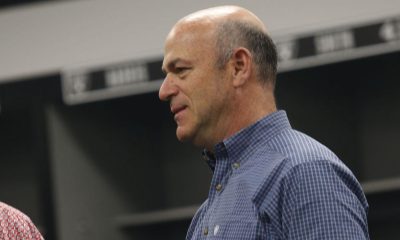Bay Area
City Auditor Says Mayor Schaaf Misused City Money and Resources to Fund Oakland Promise

Mayor Libby Schaaf directed the city administration to make “inappropriate contributions” to her favored nonprofit organization, The Oakland Promise, bypassing the Oakland Municipal code and paying the director of Oakland Promise over $700,000 without authorization, according to the findings of an investigation released this week by the Oakland Office of the City Auditor.
The office of the City Auditor Courtney Ruby conducted the investigation in response to multiple “whistleblower allegations” and questions raised by the City Council in June 2019.
The Oakland Promise, a nonprofit “multi-agency partnership” that includes the Mayor’s Office, the Oakland Unified School District, the East Bay College Fund and the Oakland Public Education Fund, raises money to provide scholarships and other educational opportunities for Oakland youth. The organization began in 2014, and in 2015, the Mayor’s Office joined the partnership “and assumed a leadership role in collaborating with these organizations,” according to the auditor’s report on the investigation.
In June 2019, the East Bay College Fund changed its name to Oakland Promise, which became a registered nonprofit organization.
The auditor’s investigation concluded:
• “The Mayor’s Office directed the City Administration to provide workspace to Oakland Promise without following Municipal code requirements.” Without proper authorization, starting in 2016, the city provided three workstations, phones, computers and internet for up to five Oakland Promise employees for two years on the 11th floor of City Hall. “This arrangement … contrasts with other third-party organizations that have used city-owned real property,” the report said. “Other third-party entities using city-owned real property have formal agreements and were charged rents (and) have provided verification of insurance coverage.)”
•“For 16 months (from July 2015 – Nov. 2016), the Mayor’s office allowed an Oakland Education Fund employee to lead Oakland Promise as the “Mayor’s Director of Education” without executing an agreement to ensure the City’s interests were promoted and protected.”
•Since fiscal year 2017-2018, the city has funded the Mayor’s Director of Education, who continued to work for Oakland Promise, “without authorization from the City Council as an in-kind contribution to Oakland Promise, at a cost to the city exceeding $700,000.”
The Mayor’s Director of Education, David Silver, was not mentioned by name in the auditor’s report. “City financial records show that (David Silver) has accounted for $704,374 in direct personnel-related costs from the city’s General Purpose fund between July 1, 2017 and Nov. 7, 2019.
In August 2015, Mayor Schaaf submitted a Memorandum of Understanding (MOU) to the City Council to implement Oakland Promise, approving it herself while the council was on summer recess. A memo from the mayor stated that the “MOU has no cost implications to the City of Oakland.”
According to the auditor’s findings,“It wasn’t until June 2019 that a republic report summarized the city’s financial and in-kind contribution to Oakland Promise.”
In total, the city has contributed $4,372,428 to Oakland Promise, including authorized and unauthorized expenditures and excluding the cost of in-kind donation of office space and equipment, which is unknown.
Among its recommendations, the City Auditor suggested that the city administration “should comply with the Municipal Code in providing space to other others” and suggested that the City Council request a yearly report on leases and other arrangements with organizations that use city facilities. The auditor also suggested that the City Council develop a policy that requires in-kind contributions to be “formally authorized in advance.”
The Mayor’s Office agrees with all of the recommendations, said Justin Berton, the mayor’s director of communications.
“The Office of the Mayor is grateful for the City Auditor’s detailed report that concludes every contribution to the Oakland Promise is being used to send more kids to, and through college,” he said. “We regret, however, that in the eagerness to launch a generation-changing education initiative, we unintentionally failed to properly document the legal use of City Hall office space and a grant to support an employee’s salary. We wholeheartedly support all of the City Auditor’s recommendations that will bring clarity to this process in the future.”
A more complete report on this investigation will be published in next week’s Oakland Post.
Activism
Oakland Post: Week of April 24 – 30, 2024
The printed Weekly Edition of the Oakland Post: Week of April 24 – 30, 2024

To enlarge your view of this issue, use the slider, magnifying glass icon or full page icon in the lower right corner of the browser window. ![]()
Alameda County
DA Pamela Price Stands by Mom Who Lost Son to Gun Violence in Oakland
Last week, The Post published a photo showing Alameda County District Attorney Pamela Price with Carol Jones, whose son, Patrick DeMarco Scott, was gunned down by an unknown assailant in 2018.

Publisher’s note: Last week, The Post published a photo showing Alameda County District Attorney Pamela Price with Carol Jones, whose son, Patrick DeMarco Scott, was gunned down by an unknown assailant in 2018. The photo was too small for readers to see where the women were and what they were doing. Here we show Price and Jones as they complete a walk in memory of Scott. For more information and to contribute, please contact Carol Jones at 510-978-5517 at morefoundation.help@gmail.com. Courtesy photo.
Bay Area
State Controller Malia Cohen Keynote Speaker at S.F. Wealth Conference
California State Controller Malia Cohen delivered the keynote speech to over 50 business women at the Black Wealth Brunch held on March 28 at the War Memorial and Performing Arts Center at 301 Van Ness Ave. in San Francisco. The Enterprising Women Networking SF Chapter of the American Business Women’s Association (ABWA) hosted the Green Room event to launch its platform designed to close the racial wealth gap in Black and Brown communities.

By Carla Thomas
California State Controller Malia Cohen delivered the keynote speech to over 50 business women at the Black Wealth Brunch held on March 28 at the War Memorial and Performing Arts Center at 301 Van Ness Ave. in San Francisco.
The Enterprising Women Networking SF Chapter of the American Business Women’s Association (ABWA) hosted the Green Room event to launch its platform designed to close the racial wealth gap in Black and Brown communities.
“Our goal is to educate Black and Brown families in the masses about financial wellness, wealth building, and how to protect and preserve wealth,” said ABWA San Francisco Chapter President LaRonda Smith.
ABWA’s mission is to bring together businesswomen of diverse occupations and provide opportunities for them to help themselves and others grow personally and professionally through leadership, education, networking support, and national recognition.
“This day is about recognizing influential women, hearing from an accomplished woman as our keynote speaker and allowing women to come together as powerful people,” said ABWA SF Chapter Vice President Velma Landers.
More than 60 attendees dined on the culinary delights of Chef Sharon Lee of The Spot catering, which included a full soul food brunch of skewered shrimp, chicken, blackened salmon, and mac and cheese.
Cohen discussed the many economic disparities women and people of color face. From pay equity to financial literacy, Cohen shared not only statistics, but was excited about a new solution in motion which entailed partnering with Californians for Financial Education.
“I want everyone to reach their full potential,” she said. “Just a few weeks ago in Sacramento, I partnered with an organization, Californians for Financial Education.
“We gathered 990 signatures and submitted it to the [California] Secretary of State to get an initiative on the ballot that guarantees personal finance courses for every public school kid in the state of California.
“Every California student deserves an equal opportunity to learn about filing taxes, interest rates, budgets, and understanding the impact of credit scores. The way we begin to do that is to teach it,” Cohen said.
By equipping students with information, Cohen hopes to close the financial wealth gap, and give everyone an opportunity to reach their full financial potential. “They have to first be equipped with the information and education is the key. Then all we need are opportunities to step into spaces and places of power.”
Cohen went on to share that in her own upbringing, she was not guided on financial principles that could jump start her finances. “Communities of color don’t have the same information and I don’t know about you, but I did not grow up listening to my parents discussing their assets, their investments, and diversifying their portfolio. This is the kind of nomenclature and language we are trying to introduce to our future generations so we can pivot from a life of poverty so we can pivot away and never return to poverty.”
Cohen urged audience members to pass the initiative on the November 2024 ballot.
“When we come together as women, uplift women, and support women, we all win. By networking and learning together, we can continue to build generational wealth,” said Landers. “Passing a powerful initiative will ensure the next generation of California students will be empowered to make more informed financial decisions, decisions that will last them a lifetime.”
-

 Activism4 weeks ago
Activism4 weeks agoOakland Post: Week of March 27 – April 2, 2024
-

 #NNPA BlackPress4 weeks ago
#NNPA BlackPress4 weeks agoBeloved Actor and Activist Louis Cameron Gossett Jr. Dies at 87
-

 Community1 week ago
Community1 week agoFinancial Assistance Bill for Descendants of Enslaved Persons to Help Them Purchase, Own, or Maintain a Home
-

 Activism3 weeks ago
Activism3 weeks agoOakland Post: Week of April 3 – 6, 2024
-

 Business1 week ago
Business1 week agoV.P. Kamala Harris: Americans With Criminal Records Will Soon Be Eligible for SBA Loans
-

 Activism2 weeks ago
Activism2 weeks agoOakland Post: Week of April 10 – 16, 2024
-

 Community1 week ago
Community1 week agoAG Bonta Says Oakland School Leaders Should Comply with State Laws to Avoid ‘Disparate Harm’ When Closing or Merging Schools
-

 Community6 days ago
Community6 days agoOakland WNBA Player to be Inducted Into Hall of Fame

























































